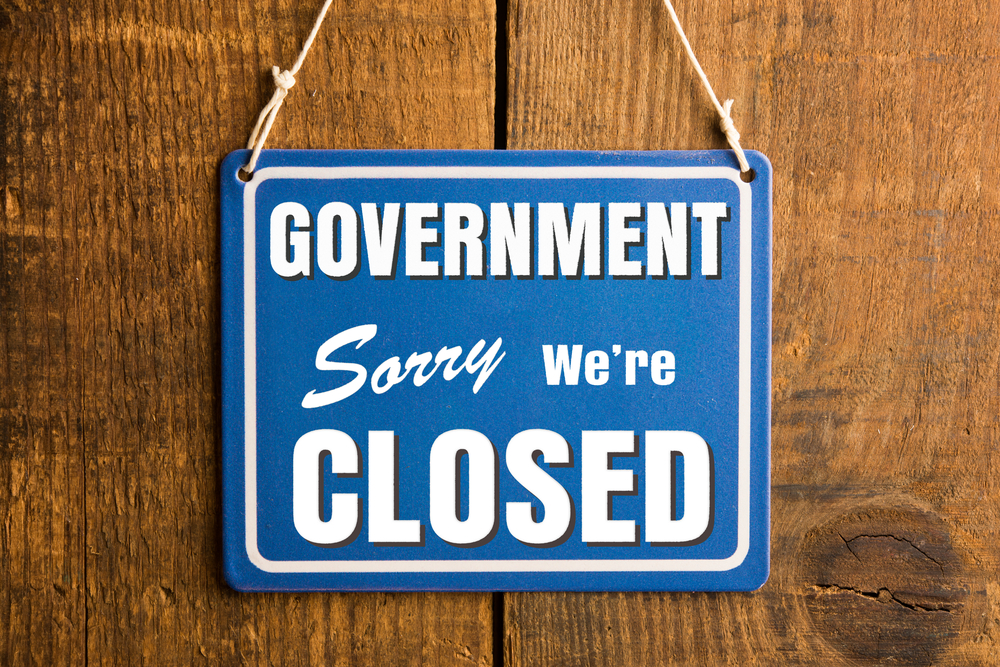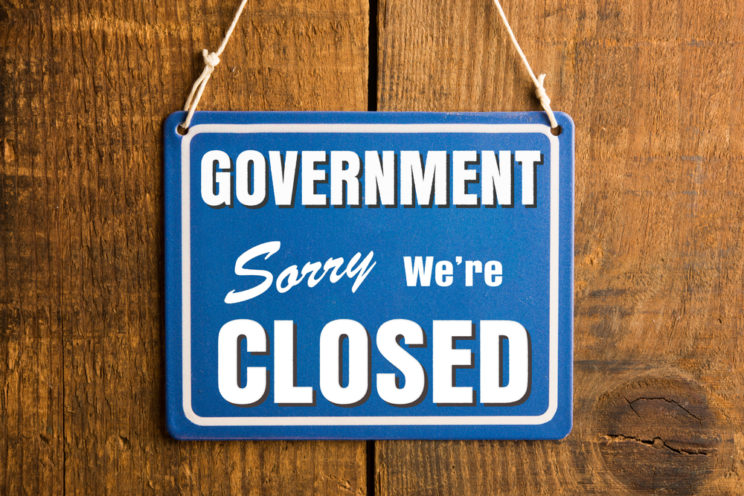 Update: January 18, 2019 – It is day 28 of the now longest partial government shutdown in U.S. history and there is no end in sight. In the seven days since we published the article below, on the impact of the shutdown on the people the Justice & Diversity Center (JDC) serves, there is little evidence that the dispute in Washington will be resolved quickly. The partial shutdown continues to have severe negative impacts.
Update: January 18, 2019 – It is day 28 of the now longest partial government shutdown in U.S. history and there is no end in sight. In the seven days since we published the article below, on the impact of the shutdown on the people the Justice & Diversity Center (JDC) serves, there is little evidence that the dispute in Washington will be resolved quickly. The partial shutdown continues to have severe negative impacts.
Here’s what we learned this past week:
Housing
As we reported last week, most housing subsidies are expected to be paid for January and February. However, by March, housing providers will need to access reserves, an action that requires permission from the Department of Housing and Urban Development (HUD). With only about 300 out of 7,000 HUD employees working, this could become problematic.
The ongoing shutdown is thus threatening to destabilize households that depend on HUD’s rental assistance programs and creating widespread uncertainty for affordable housing investors.
Furthermore of concern is the shutdown’s impact on the housing stability of low-wage government workers and contractors who often live paycheck to paycheck. These employees, including janitors, security guards, and cafeteria servers, are currently receiving no pay and are at risk of being unable to cover their rent, putting them at risk of eviction, if the shutdown continues.
Federal Courts
On January 17, the American Bar Association (ABA) issued a statement, urging the administration and Congress to reach a solution. Due to the shutdown, funds for federal courts will run out next week. Immigration courts, which have no current funding and are already dealing with an 800,000-case backlog, have canceled more than 42,000 hearings, forcing people who have waited years for justice to wait even longer. The number of cancelled hearings is expected to grow by 20,000 each week the government remains shut. “Keeping our courts open and running is not a political issue,” ABA President Bob Carlson urged. “Rather, it is essential to the protection of due process and the rule of law.”
Food Assistance
CalFresh announced that food assistance benefits for February will be issued early. However, funding for March benefits remains uncertain. In addition, child nutrition programs, including school breakfasts and lunches and after-school meals, will continue into February, according to the U.S. Department of Agriculture.
However, the Special Supplemental Nutrition Program for Women, Infants, and Children (WIC) has federal funding to last only through January, the National WIC Association reports.
As the government shutdown drags on, more programs and public services will begin to suffer. For instance, federal grants to public mass transportation agencies may be threatened as we move into early spring. With the IRS services mostly shut, some students and families have reportedly had problems obtaining income verifications needed for federal student loans and grants. For more, see CNN’s list of 91 (and counting) direct effects of the shutdown.
January 11, 2019 – The ongoing federal government shutdown is set to break an unfortunate record tomorrow and become the longest shutdown in U.S. history.
The partial shutdown, which began on December 22, has put the economic safety of nearly 800,000 federal employees at risk. Approximately half are furloughed, while the services of approximately 420,000 federal employees are deemed essential, forcing these employees to work without pay. It also affects thousands of private contractors, companies and individuals who are not government employees but contract with the government and are now out of work.
In addition, the shutdown threatens the safety and livelihood of countless low-income and immigrant families, who rely on the services provided by affected federal agencies. These agencies include the Department of Housing and Urban Development, the Internal Revenue Service, federal courts including immigration courts, and the United States Department of Agriculture, the agency that administers the Supplemental Nutrition Assistance Program, commonly known as food stamps.
The impact of the shutdown on the people we serve
The Justice & Diversity Center (JDC) of the Bar Association of San Francisco serves over 8,500 low-income people each year, many of whom are immigrants, survivors of violence, homeless or at risk of homelessness, with physical or mental health disabilities.
Each additional day of the government shutdown worsens the effects felt by the most vulnerable members of our community. Many already face uncertainty, delays, and interruption of benefits.
Federal and Immigration Courts
While the Northern District remains open, civil cases involving the U.S. as a party are being delayed because the U.S. Attorney’s Office’s Civil Division is largely furloughed. For clients of JDC’s Federal Pro Bono Project where the United States is a party to their case, this means there will be no hearings, no settlement conferences, and no trials until the shutdown is over.
The government shutdown also worsens the already enormous strain on the U.S. immigration system, its courts, and the thousands of immigrants moving through them every day. Clients of JDC’s Immigrant Legal Defense Programs now face even more uncertainty.
Currently, the Immigration Court is still holding hearings for detained immigrants. Judges in those cases are deemed essential and are adjudicating those cases without pay.
However, the Court is closed for non-detained cases, which form the majority of cases in the US immigration courts. During the shutdown, the court is cancelling non-detained status and merits hearings, and is not accepting any filings or briefing in those cases. Given the sudden and unpredictable nature of the shutdown, the court is unable to provide any advance notice to respondents that their hearings will in fact be cancelled, or when cancelled hearings will be rescheduled.
As a result, some unrepresented immigrants have travelled long distances from the Oregon and Nevada borders and the Central Valley, to appear for their court appearances in San Francisco and have simply been told the court is closed. Other immigrants who are subject to a one-year filing deadline for asylum applications are unable to timely file those applications with the court during the shut-down. Immigrants and attorneys with hearings scheduled are in limbo about whether to spend valuable time and expense in preparing for hearings that may not happen. They are uncertain about whether to spend the hours needed to prepare for testimony and all the other costs entailed in a hearing, including reserving experts’ time, making travel plans, and many other arrangements.
It is unknown when these cancelled dockets will be rescheduled, but given the already pre-existing backlog, it is likely that the rescheduled cases may be delayed for years, thereby worsening the backlog even further. The delays also put additional strain on immigrants seeking to resolve their cases, struggling to pay for ongoing legal counsel, help additional family members immigrate from dangerous or isolated conditions, and move forward in their lives.
Internal Revenue Service (IRS)
The IRS is closed entirely and not answering phones, faxes, or mail. No new liens or levies are being issued at this point; however, if a levy on Social Security Benefits or a wage garnishment was already in process on an account, a client cannot get a release of the levy, even if they are experiencing severe hardship. Also, clients whose passports were revoked or denied due to tax debt cannot receive any relief.
JDC’s Low-Income Taxpayer Clinic and its volunteer attorneys are unable to work with the IRS on any of JDC’s clients’ cases at this time, or even gain access to client’s accounts to review issues. The clinic serves about 250 people each year.
While the IRS is opening mail and date-stamping it, no actions are being taken during the shutdown. However, taxpayers still must meet any statutory deadlines by filing certain forms on time.
Furthermore, Tax Court is closed until further notice. Some trial sessions are moving forward, but others have been canceled. A decision regarding the upcoming February 4 trial sessions will be made on or before January 18.
Departments of Housing and Urban Development (HUD) and Agriculture (USDA)
JDC’s Homeless Advocacy Program (HAP), based in the Tenderloin neighborhood known as the epicenter of our community’s homelessness crisis, serves more than 2,000 people each year. HAP holistic service approach includes legal and social support services including benefits advocacy in addition to eviction defense.
The partial government shutdown puts HAP clients at risk, as more of HUD’s Section 8 rental assistance contracts are expiring or under suspension. Currently, roughly 1,150 HUD contracts are suspended because they were not renewed by December 22. This affects roughly 70,000-85,000 low-income households nationwide. The number of expiring contracts will increase as time goes on. HUD anticipates an additional 500 contracts will expire in January, and an additional 550 in February. At least six of these contracts are in San Francisco.
Food stamp benefits, administered by the USDA, are guaranteed through February, but funding for March is uncertain. In San Francisco, where 23 percent of residents struggle with hunger and nearly one out of four children lives in food-insecure households, an interruption in benefits would be devastating.
Equal Employment Opportunity Commission (EEOC) Complaints
The EEOC takes complaints of discrimination in employment. The agency is currently closed due to the shutdown, so any such complaints cannot be made, no matter how egregious the situation.
These are just a few examples of the wide-ranging effects the ongoing partial federal government shutdown has on employees, contactors, courts, and the people they serve. “As it is right now, each day that these folks have not been paid, each day that they’re not performing their jobs there’s already harm that’s been done, so let’s be clear about that,” Senator Kamala Harris said on CBS yesterday, “This has already been something that is hurtful and harmful to the American people.”
In order to stop the escalating harm, as San Francisco Mayor London Breed said last week, “we need a functioning government.”



